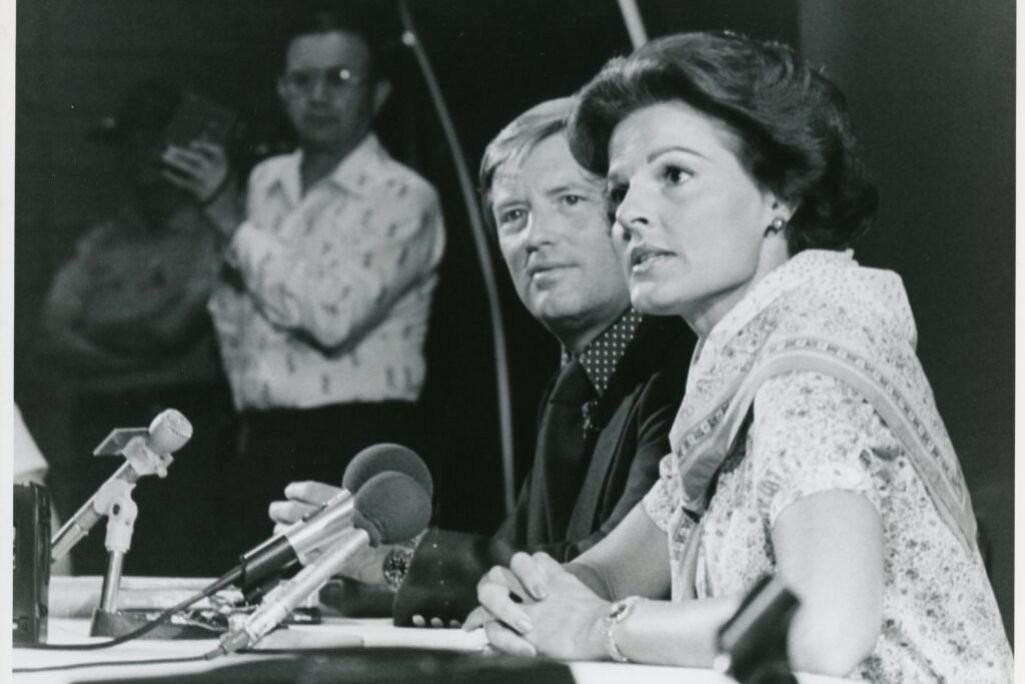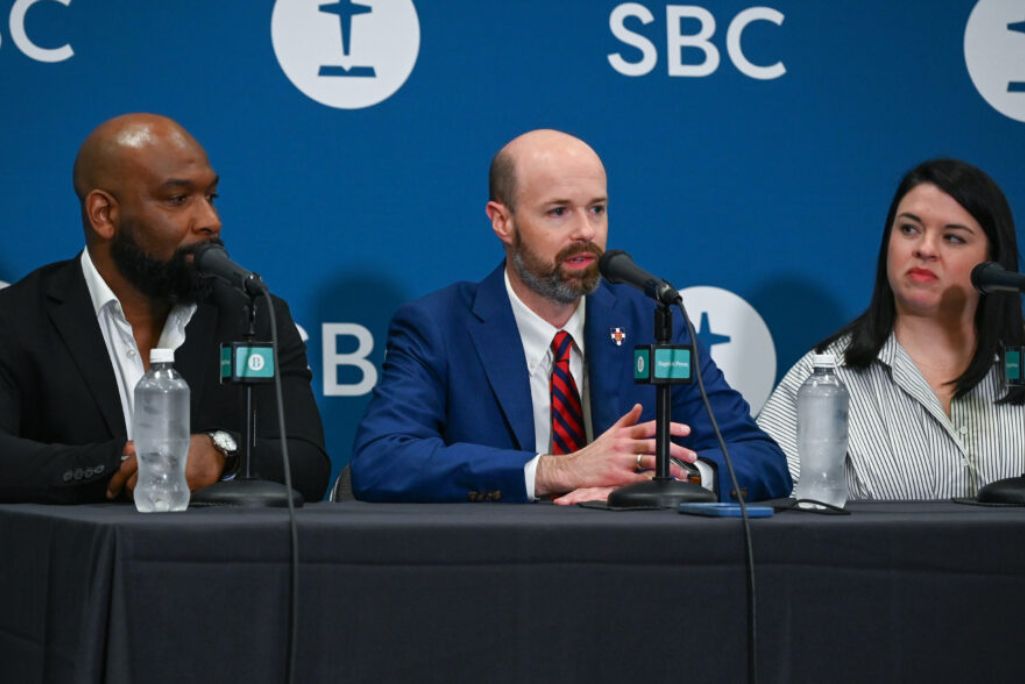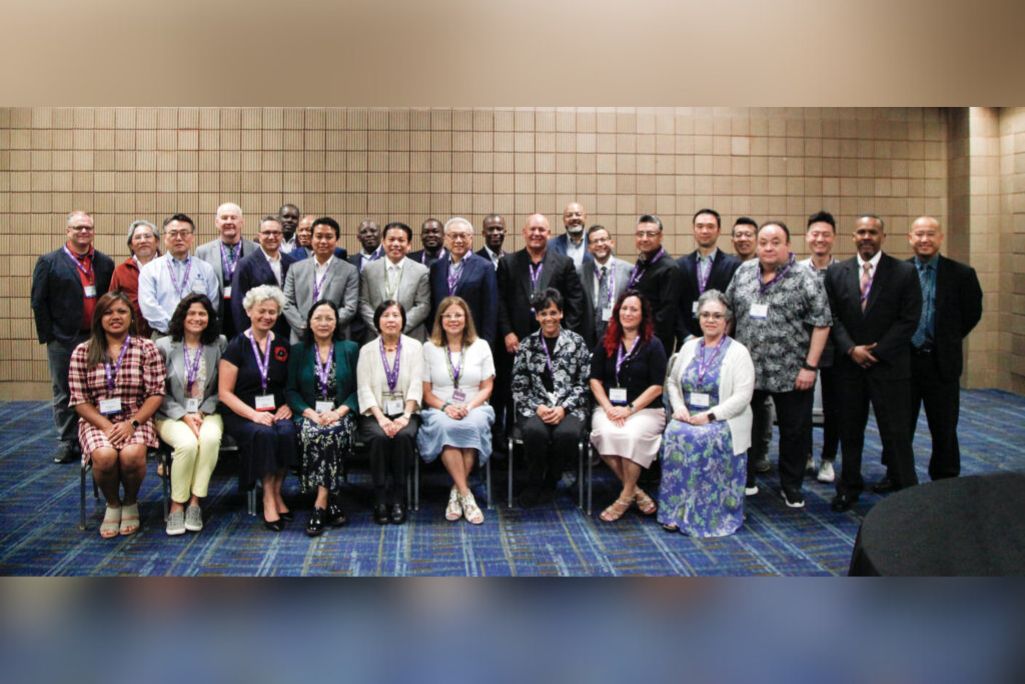
Anita Bryant and her husband Bob Green holding a press conference in 1978.
EDMOND, Okla. (BP) — Anita Bryant, an entertainer who was commended by the Southern Baptist Convention (SBC) for standing up to the gay rights movement in the 1970s, died Dec. 16 at age 84.
Bryant was mentioned by name in a 1977 SBC resolution on homosexuality commending her and other Christians who successfully campaigned to reverse a first-of-its-kind ordinance prohibiting discrimination against gays in Miami, where she lived at the time.
The resolution praised Bryant’s “courageous stand against the evils inherent in homosexuality,” and the next summer the convention approved a resolution “on commendation of Anita Bryant,” reiterating its support of her efforts.
In 1978, Bryant — accompanied by Georgia state troopers while 2,000 gay rights activists demonstrated outside — gave her testimony and sang at the SBC Pastors’ Conference and was nominated for first vice president at that year’s annual meeting in Atlanta.
A Southern Baptist from Oklahoma, Bryant was crowned Miss Oklahoma in 1958 and as a pop singer in the 1960s performed on seven of Bob Hope’s USO Christmas tours. She appeared on Dick Clark’s “American Bandstand” and sang at the White House and at President Johnson’s graveside service, according to an obituary released by her family Jan. 11.
Bryant sang at both the Republican and Democratic national conventions in 1968, sang at the Super Bowl in 1971 and co-hosted the nationally televised segment of the Orange Bowl Parade for nine years as a spokesperson for Florida orange juice.
Such fame boosted her voice when she perceived in 1977 that Miami’s proposed ordinance would threaten the welfare of children and began to speak against it.
“As a mother, I know that homosexuals cannot biologically reproduce children; therefore, they must recruit our children,” Bryant said at the time, according to the Miami Herald. She “feared that if gay teachers were hired at her children’s Christian school, they would influence students to become gay,” the newspaper said.
“What these people really want, hidden behind obscure legal phrases, is the legal right to propose to our children that theirs is an acceptable alternate way of life,” Bryant said.
A front-page New York Times obituary for Bryant on Jan. 9 quoted her saying the ordinance “condones immorality and discriminates against my children’s rights to grow up in a healthy, decent community.”
Despite her efforts, by a 5-3 vote of commissioners, Miami-Dade County became the first major metro area in the U.S. to pass legislation protecting gays in employment, housing and public services. Bryant founded Save Our Children and led a petition for a public vote on the law, and six months later, 69% of county voters repealed it.
“It took the county 21 years to restore the law,” the Miami Herald said, referring to its passing again by one vote in 1998.
Anthony Verdugo, executive director of Christian Family Coalition Florida, called Bryant “the first parental rights champion in our country.”
“She had a huge impact and will be remembered not as anti-anything but as pro-family, pro-children, pro-parent, pro-home,” Verdugo said in the Miami Herald. “She had the vision to see what was coming and foretold the battle we fight today, recognizing that there is nothing civil or human or right about imposing ideology under the cover of education.”
Following her successful campaign against the ordinance, Bryant’s contract with Florida Citrus was canceled and she lost other endorsements and began to be lampooned on television shows such as “Saturday Night Live” and “The Carol Burnett Show” and in movies and other pop culture references.
Her first marriage ended in divorce, she filed for bankruptcy and spiraled into severe depression, yet she said in a 1990 television interview, “I don’t regret it, because I did the right thing. Sometimes you have to pay a price for what you believe is right,” The Times reported.
Albert Mohler, president of Southern Baptist Theological Seminary, recalled on The Briefing podcast Jan. 13 that he heard Bryant sing in 1977 at a rally at the Miami Beach Convention Center that included Jerry Falwell, who would go on to found the Moral Majority.
The gay rights movement, Mohler said, made Bryant the poster child of opposition to their cause and “an engine for their own political purposes.”
“One of the techniques used to marginalize Anita Bryant was to treat her as a freak show,” Mohler said, “… and that’s the threat that same movement would try to apply to every single person who would stand in its way.
“And if you dare to stand in opposition to that movement, guess what. You will end up on the front page of The New York Times as an obituary and the movement will claim that you deserve the ridicule,” Mohler said. “But let’s remember this …: The LBGTQ movement is not going to have the last say.”


